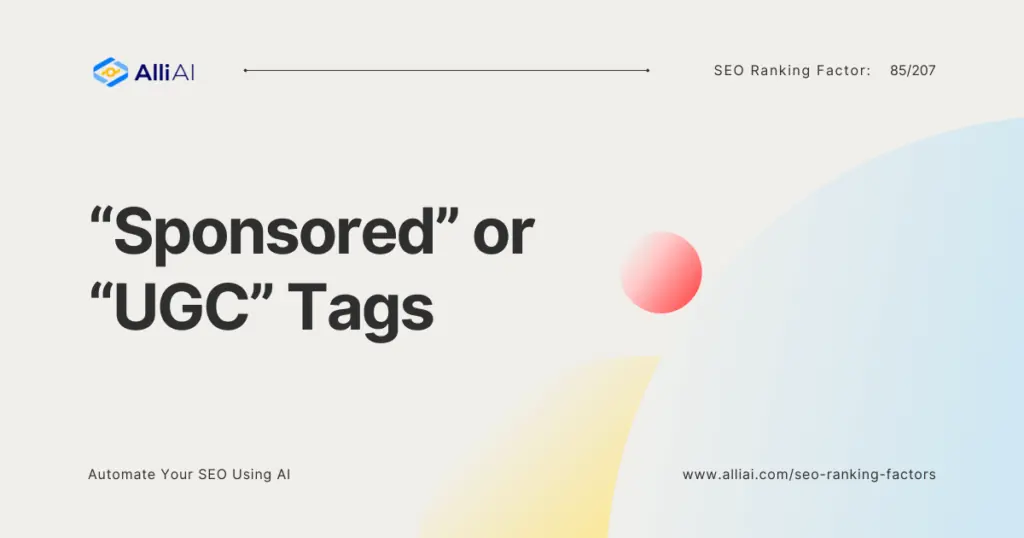Understanding the Role of “Sponsored” and “UGC” Tags in SEO
A ranking factor in SEO refers to the criteria applied by search engines to evaluate web pages when determining the most relevant pages to display in search results. Among these are “Sponsored” and “UGC” tags, which play a unique role in how content and links are interpreted by search engines.
Sponsored Tags: These are used to identify links on a website that are part of advertisements, sponsorships, or other compensation arrangements. Essentially, it tells search engines that the link was paid for, helping to distinguish between organic and paid content.
UGC Tags: UGC stands for User Generated Content. These tags are used to mark links that appear within user-generated content, such as comments and forum posts. It helps search engines understand that these links may not have been editorially placed by the site owner.
Think of a national park with various trails. Some trails are marked as “Sponsored” because companies pay to have their names associated with the trail upkeep. Others are marked as “User Created” because they were made by visitors’ frequent walks, not the park’s official maintenance team. Just as these designations help park visitors understand the origin and purpose of the paths, “Sponsored” and “UGC” tags help search engines understand the nature of web content and links.
Why Are “Sponsored” and “UGC” Tags Important in SEO?
Introduced by Google as part of its ongoing efforts to ensure transparency and fairness in web content, “Sponsored” and “UGC” tags were specifically designed to address the rise of paid content and user-generated content within search contexts. These tags help distinguish between commercially influenced content and organically created material, providing clearer insights to search algorithms and users alike.
How “Sponsored” and “UGC” Tags Affect SEO
Using “Sponsored” and “UGC” tags correctly can impact your website’s perceived authority and relevance. By clearly marking paid links and user-generated content, you signal to search engines that you’re adhering to best practices and transparency standards. This can positively influence your site’s ranking and credibility.
Incorrect or fraudulent use of “Sponsored” and “UGC” tags, or not using them where necessary, could lead to search penalties. Google, for instance, has clear guidelines requiring the use of these tags to prevent misleading search algorithms. Failure to comply can result in lowered rankings or the removal of pages from search results.
According to Moz’s Search Engine Ranking Factors report, trustworthiness, link signals, and page features are among the top criteria used by search engines for ranking websites. While direct statistics on the impact of “Sponsored” and “UGC” tags specifically may be scarce, their role in maintaining site integrity and trust aligns perfectly with these broader ranking criteria.
Technical Implementation of “Sponsored” and “UGC” Tags
Implementing these tags correctly is crucial for compliance with search engine guidelines. Here’s how you can integrate these tags into your HTML effectively:
Sponsored Links: For any paid or advertisement-related link, add
rel="sponsored"within the anchor tag:
<a href=”http://example.com” rel=”sponsored”>Visit our sponsor</a>
- User-Generated Content: For links within comments or forum posts, use
rel="ugc":
<a href=”http://example.com” rel=”ugc”>User-contributed link</a>
Best Practices and Common Concerns
To make the most of these link attributes, keep these best practices in mind:
- Audit Your Website: Regularly review your website’s outgoing links and ensure proper tagging.
- Communicate with Partners: Inform partners and advertisers about the use of the “sponsored” tag on their links.
- Handle UGC Platforms: For UGC platforms that don’t allow custom attributes, focus on moderating and filtering out spammy links.
Some webmasters express concerns about the potential impact of “nofollow” on affiliate links. However, Google treats both “nofollow” and “sponsored” similarly in terms of link equity, so there’s no need to worry about negative effects.
FAQ
How do I correctly use “Sponsored” and “UGC” tags?
It’s important to add rel=”sponsored” to all outbound links that are advertisements or paid for in any way. For user-generated content with links, use rel=”ugc” to ensure search engines understand the content’s context.
Can using these tags negatively impact my SEO?
Not directly. If used correctly, these tags should not negatively impact your SEO. They may, in fact, protect or potentially improve your site’s performance by ensuring transparency and adherence to search engine guidelines.
Do I need to use these tags on all links within my content?
No, these tags are specifically for identifying paid links (sponsored) and links within user-generated content (UGC). Regular outbound or inbound links that are editorially given don’t require these tags.
Conclusion
“Sponsored” and “UGC” tags play a subtle yet crucial role in SEO. They’re not just about following search engine guidelines; they’re about maintaining trust with your audience and ensuring the integrity of the web. By using these tags appropriately, webmasters and SEO strategists can avoid penalties, improve their site’s credibility, and contribute to a more transparent online ecosystem. Remember, in the world of SEO, honesty, and clarity with both users and search engines are key to long-term success.






